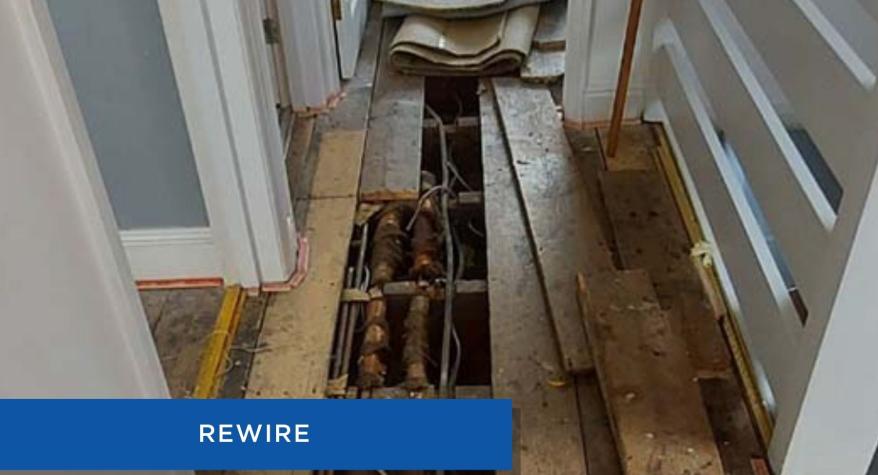Rewire Electricians in Bristol
What is a rewire?
A rewire is a complete replacement of your home’s electrical cables, sockets, switches, fuse box and other electrical accessories.
How often is a rewired needed?
A rewire is needed under many different circumstances. The main issues that would see the need for a rewire arise would be:
Cable insulation degradation
Electrical cables are manufactured in copper, a highly conductive metal that is perfect for transmission of electricity. In order to protect us from shock and to prevent the electrics from shorting out there is an insulating material that wraps around the copper wires.
This insulation has a lifespan that is affected by numerous factors such as temperature, wear, and tear, how many electrical faults have occurred and general electrical load that is placed on the cables.
Dangerous additions
Where unsafe additions have been made to the electrical system throughout the wiring it can be financially sensible to rewire rather than carry out multiple repairs. Its sensible to consider the age of the existing wiring and the cost of repairs when making a decision.
Major renovations
Where major renovations are due to take place, an electrical inspection is recommended before carrying out works on the wiring system. If the renovation works are to involve the majority of the property, then its sensible to consider a rewire at the same time to avoid the necessity of the works being carried out in the future.
Every home is different and your electrician is best placed to advise on what is necessary.
Trauma
Lighting Strike, severe flooding and fire are all going to affect the wiring in a property. The only way to ascertain the condition of the electrical system following such trauma is to have an electrical inspection carried out.
Visual Age
Where wiring is clearly very old, a rewire is strongly recommended. Rubber insulated or lead sheathed cables are now over half a century old and should be replaced for safety reasons in most cases.
What is involved in rewiring a house?
A home rewire will involve routing new cables from the consumer unit (fuse box) to each place where electricity is required. Every plug socket, light switch, light fitting, cooker switch, and other electrical accessory will require power and as such, electricians need to find cable routes to each of these places.
Walls will need channels cut into them, floorboards will need to be lifted and the cable routes planned carefully.
Electrical testing and inspection are carried out by the electricians throughout the process to ensure that the cabling is safe, in good condition from the manufacturer and to ensure that the electrical system meets the standards of the safety wiring regulations.
Once all the cables are installed, the sockets, switches and consumer unit have been installed, final testing is carried out to ensure that the earthing is in place and correct, the system has no ‘electrical leaks’, there are no cross connections or electrical short circuits and to make sure that the system is safe to energise.
The electric shock protection devices are tested at the consumer unit to make sure they are functioning correctly and turning the power off when required.
The Electrical Installation Certificate is produced and the works are notified to building control where required in England and Wales.
If you would like more information about a home rewire then get in touch with us. We are your local REWIRE ELECTRICIAN IN BRISTOL and the ‘go to’ experts in this area.





